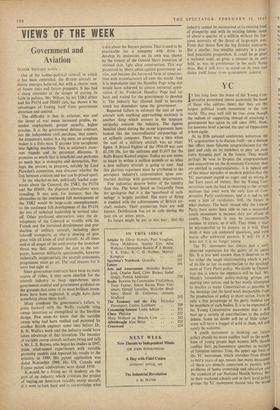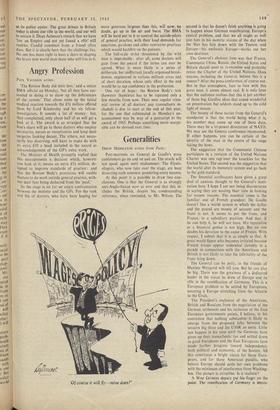Y C
IT has long been the boast of the Young Con- servative movement (more accurately the boast of those who address them) that they are the largest political youth movement in the free world. This may well still be true, even though the tedium of supporting instead of attacking a government has taken its toll since 1951. Now, for however brief a period, the spur of Opposition is here again.
At its fifth national conference tomorrow the YC organisation is to discuss itself—on a motion that offers them fulsome congratulations for the past and calls on its members to play 'an even more dynamic part' in the future, They would perhaps be wise to by-pass the congratulations and concentrate on the dynamism. Certainly they are entitled to congratulations: it is indeed one of the minor miracles of modern politics that the YC movement stayed so eager and so strong in the Tory years of victory. But the Young Con- servatives took the lead in objecting to the syrupy motions that once were the only fare of Con- servative Party conferences, and it is sad to see even a hint of recidivism. Still, the future is what matters. The basic reason why the Labour Party have never been able to run a successful youth movement is because they are afraid of youth. They think it may be inconveniently anxious to attack; so it will. They think it maY be disrespectful to its seniors; so it will. They think it may ask 'awkward questions, and eyen worse offer awkward answers. It will. Or if it does not it is no longer young.
The YC movement has always had a well- deserved reputation. for the gaiety of its social life. It is less well known than it deserves to be for either the tough electioneering which is part of its life or for its contribution to the develop- ment of Tory Party policy. No doubt in Opposi- tion this is where the emphasis will be laid. Mr. Heath's formidable policy-making groups are moving into action, and he has wisely attempted to involve as many Conservatives as possible in the meetings and the hard work inseparable from the production of policy at short notice. Even so only a tiny percentage of the party faithful can be members of such bodies. It is to be expected of the Young Conservative movement that it will hurl up a variety of contributions to the policY debate. Some no doubt will be of little value: some will have a nugget of gold in them. All will surely be welcome.
A youth movement in thinking out future pcilicy should no more confine itself to the prob- lems of young people than women MPs should confine their parliamentary speeches to matters of feminine interest. True, the upper age limit Of the YC movement, which stretches' from fifteen to thirty years of age, means that many thousands of them are directly concerned as parents with problems of home ownership and education and the standard of our National Health Service. But in their weekend schools and in their local policY groups the YC movement should take the world as its policy oyster. The great debate in Britain today is about our role in the world, and our will to sustain it. Dean Acheson's remark that we have 'lost an Empire and not yet found a role' still rankles. Candid comment from a friend often does. But it is clearly here that the challenge lies. No one has more right to have a share in shaping the brave new world than those who will live in it.


































 Previous page
Previous page